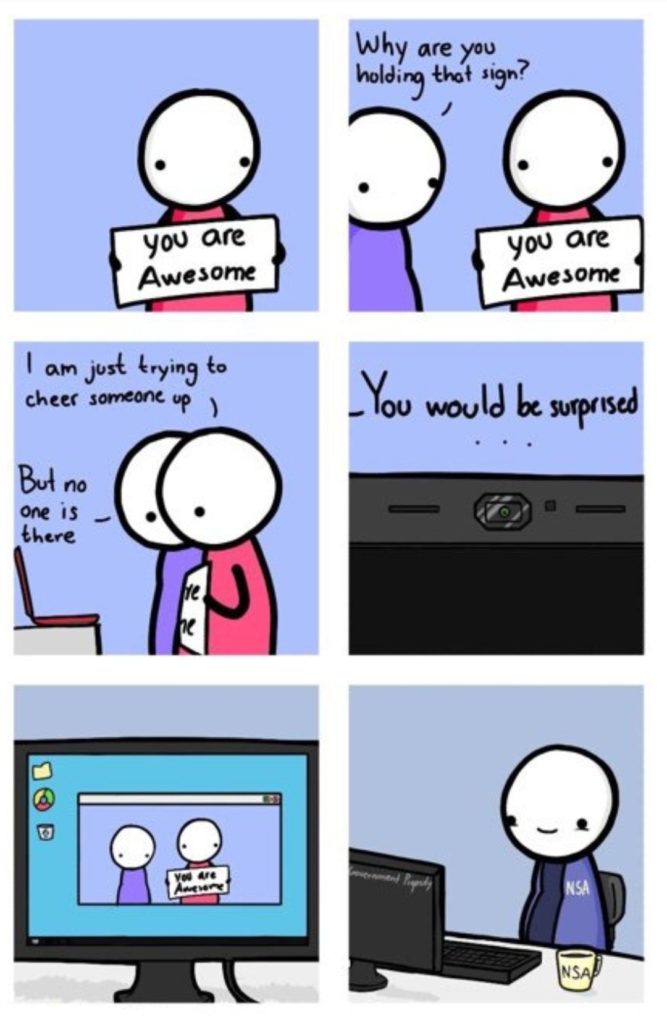Big Tech knows everything about you. If you haven’t taken any precautions to protect your privacy online, Big Tech [and by extenstion Big Government] may even know you better than you know yourself. Every time you’ve tapped on your keyboard, they’ve been watching…
While most of us have gotten used to relinquishing control of our personal data, realize this has come at a massive, previously unforseen cost. Private data is big money; and now, it’s also Big Brother.
Virtually all social media sites and search browsers spy on your behavior, collect data, create an online avatar from your user history, and categorize the online “you”.
You might be thinking, “Big deal. I haven’t done anything wrong, and I don’t have anything to hide.”
Reading “Three Felonies a Day” might cure you of such naïveté. But beyond your belief that you’ve never committed wrongdoing that would invite the government’s ire, it’s not just the law you need to be concerned about: It’s the psychological experiments Big Tech conducts at your expense.
They’re engineering YOU.
Data Collection + the Digital You
Virtually every social media platform and search engine is collecting massive troves of personal data from billions of people. Facebook, SnapChat, Twitter, TikTok, Google- all of them track, collect, and store an unbelievable amount of personal data about each user, then use the information collected for previously unimaginable ends.

Facebook caught some heat in the early 2010’s, when it was revealed they sold user’s private information to Cambridge Analytica, a company that purchased the data of 87 million Facebook users in order to psychologically manipulate them to sway votes. Unfortunately, the general public are much less familiar with the social engineering experiments which have been taking place on these social media sites and browsers since then.
One such example of Big Tech’s experimentation is Facebook’s “social contagion” and emotional manipulation study among its users; Working with researchers from Cornell University and the University of California, they conducted experiments on over 650,000 people [without their knowledge], during which, posts were manipulated in order to influence positive or negative moods among users. Researchers who conducted these experiments boasted this was “the first experimental evidence for massive-scale emotional contagion via social networks.”
What does this mean, exactly?
Essentially, they were studying memetics. In Richard Dawkins’ 1979 book, “The Selfish Gene“, he describes how ideas and behaviors spread throughout groups, first starting as a meme– or a unit of information- that spreads like a virus throughout a population, changing behaviors, styles, thoughts, and culture.
Studies on “social contagion” are psychological experiments focused on manipulating the thoughts, moods- and by extension- actions of users. Data collected from these covert studies on unwitting “participants” are used to sway political affiliation at Big Tech’s whims, shape opinions, manipulate thoughts, and spread chosen ideas- or memes– throughout a population… without the users’ knowlege.
Inorganic ideas are planted in the minds of users, making those on the platform believe their thoughts are their own, when in fact, Big Tech carefully crafts both the seeds and the responses of its users.
This is just the tip of the ice berg; One that should send shivers down anyone’s spine.
You’re an Enemy of the State

Social engineering extends far beyond social media’s experiments- it’s ever present in your everyday life. If, like most, you use Google as your main search browser, every search you’ve entered into the engine has been duly noted, your online behavior analyzed, a personality prescribed to the online “you”, and your search results curated.
Often sold as a net positive, such detailed analytics allow Google and other companies to utilize this data and specifically tailor advertisments [by selling the data to third parties] and search results for each user. But this is a superficial explanation of the true capabilities and uses of the personal information gathered; There is a dark underbelly to such massive data collection.
Remember: When a service is “free”, the product is you.
Spying Software, Black Lists + Keyloggers
The scope of Big Tech’s [and Big Government’s] data collection is so immense, I’ll focus on just three of the most ubiquitous programs currently used in the world’s most popular browser [Google], social media platform [Facebook], and operating system [Windows].
Jigsaw
Google has its hands in plenty of pies, from manipulating search results, to blacklisting websites, but one of its newest additions is Jigsaw, an artificial intelligence-based system billing itself as a new tool for “a safer internet” and a “safer world”.
Jigsaw’s AI scans the web, then categorizes lanaguage and people as “Toxic”, “Violent Extremists”, and/or agents of “Disinformation”. Under the guise of “safety”, every user’s browser history, searched websites, watched videos, and purchase habits are scraped by Big Tech/Gov, as they then decide if your beliefs are acceptable, or if you’re an enemy of the state.
And who have been the targets of this new system?
At first glance, the targets are those one might expect: ISIS, white supremacist groups, anti-government groups, extremists, and domestic terrorists. However, the categories are ever-expanding. Jigsaw has partnered with London-based company, Moonshot, to further curate Google’s collected data and help extend Jigsaw’s list to include “Incels”, “Anti-Vaxxers”, “Shitposters to Sedition[ists]”, and other such deplorables.
Beyond the covert collection of personal data, these alphabet agenices have given themselves the power to define what is “anti-government”, “extremist”, and “white supremacist”, such words becoming increasingly amorphous and capriciously changed to suit political ends. As an example, in 2021, a whistleblower came forward with FBI memos detailing how the Federal Bureau of Investigation labelled parents critical of CRT [Critical Race Theory] in their schools as ‘domestic terrorists’.
With a political landscape that has become increasingly hostile since the early 2010’s, there are those who support using this new arm of power against people with differing ideologies. But as history shows, power always changes hands over time, swinging from one end of the pendulum to the other; Weapons of war intially used against one group are just as easily wielded against others in the future.
Authoritarianism knows no bounds; To a hammer, everything looks like a nail.
Centra
The existence of Centra, one of Facebook’s tracking tools, was revealed only after a whistleblower came forward, providing details into the social media giant’s spying software [watch the video here]. Centra follows users on Facebook’s platform as well as “off-platform”. Meaning, Centra tracks users on other sites, checks contacts/messages sent, and tracks users on any pages with a Facebook button.
Considering Facebook’s penchant for blacklisting, shadow banning, and censoring users, the creation of a centralized, tracking apparatus to do so- while hiding its existence and lying to congress- makes such technology a worrisome development.
Keyloggers
Keyloggers are either software or hardware which record every keystroke made on a device. This includes: What keys are pressed, the time that they are pressed, as well as the key’s press velocity and duration of time they were pressed.
This means, if a keylogger is installed on a device, every private message, email, password, bank account login, and internet search has been tracked and recorded somewhere, and typically without the user’s knowledge.
Keyloggers can find their way onto a device by way of stealth- a hacker leaving a USB with keylogger software on it to be picked up and used by an unsuspecting victim, for example. But an even more insidious method of installing keyloggers is by simply having them on a device’s default operating system (OS).
This is exactly what Windows 10 OS has done.
If you’re using a Windows 10 system, then everything you’ve ever typed on your device, every voice command you’ve given, every private message and password keyed, has been tracked, recorded, and stored. Microsoft contends their keyloggers are meant for the sole reason of improving the interface: Making auto-complete more accurate and improve voice recognition. The company conveniently ignores, however, the lack of user consent and data vulnerability.
If you want to take back your most basic privacy, you’re in luck: Windows 10 keyloggers are easily removed:
1. First, open Settings > click on Privacy
2. While on the Privacy screen, click on Feedback & Diagnostics in the side menu, then select the Basic option
3. Go to Settings > Privacy > Diagnostics & Feedback, then turn OFF Send inking and typing data to Microsoft Option
4. Go to Settings > Privacy > Activity History and uncheck the option “Let Windows collect my activities from this PC”
And voilà! You’ve taken back some of your privacy rights you probably didn’t even know you relinquished!
How to Beat the System

Beating our Big Tech/Big Govt overlords is absolutely possible and relatively easy. The biggest obstacle most people encounter is the addiction to Big Tech’s conveniences. But once we’re ready to take control over our lives, and leave the largest surviellance system ever known to mankind, there are simple steps to follow.
The name of the game is to sever the ties between our personal identity and devices.
Goodbye, Facebook
If you’re using apps like Facebook… don’t. The best method to stop their spying is by not using these apps at all, because there is no real way to protect your privacy. Facebook utilizes a wide range of tracking tools to connect the digital you to the real you: They have your real name, your phone number, use facial recognition software on photos posted, and further verify your identity by connecting you to your Contacts. Once in their web, you can’t meaningfully extract yourself from the system while still using it.
If you can’t quit cold turkey, then at the very least, begin to manipulate the data Facebook collects from you. Start clicking on milque toast links, Big Tech “friendly” articles, sites that skew the data; The more your behavior shows the AI systems you’re moving away from Wrong Think, the less reliable your data. Eventually, they’re forced to scrap the info and move onto other users who aren’t protecting their privacy.
Every small step matters.
De-Googled Phones + Isolating Big Brother
Smart phones are the number one piece of spyware we carry with us 24/7. In order to escape their surveillance, De-Googled phones are the best option.
De-Googled phones mean two things for privacy: First, your location, identity, imei tracking serial number, and virtually all other identifying information is no longer accessible to Big Tech. However, this also means that apps like Google Maps and the Google Playstore are unavailable to users because the phone itself is unable to download Google products [but don’t worry, there are non-Google alternatives].
De-Googling an Android is possible, but it’s a steep learning curve for non-tech types. Instead, De-Googled phones are easily purchased from privacy advocates like Rob Braxman [check out his De-googled phones for sale here].
Now, regardless if you keep an Android or iPhone, you’ll need to add a few non-tracking browsers to your device. There are plenty of great options available, including Brave and Presearch. Whenever you use any Google product [Google search, Gmail, Google Drive, YouTube, etc.], always use one specific browser to do so, with which you’ll login to your Google accounts.
Never use the other non-tracking browsers to login to Google services. This means, for example, you’ll watch YouTube videos on a different browser but never login to your YouTube account. If you never login to Google services on these other browsers, Google can technically track you, but it cannot connect the data with your identity.
VPNs: Virtual Private Networks
Everything you do online is linked to an IP address [Internet Protocol address]. This IP address is connected to your home address and is permanently recorded on centralized servers.
Protecting your online privacy means obfuscating your IP address; this is done by using a VPN service. VPNs “share” your address with a network of other addresses, essentially hiding it among others in the network. This is one of the easiest and most basic ways to begin protecting your online identity.
VPNs to get you started:
Final Thoughts
There are two major threats to Big Tech’s oligarchy: Users taking back control of their personal data, and users manipulating their systems by way of confusing the algorithms.
First, take control of your personal data by detaching the connection between your identity and your devices. Use de-Googled devices when possible, further severing the ties between you and Big Brother.
If you’re still using sites and apps like Facebook, start rendering the information they do gather on you unusable. When the data gathered is frequently inconsistent, it confounds their systems and the data is scrapped. All the money and resources Big Tech pours into surveillence, “social contagion” experiments, polls, and surveys become useless.
So, if you’ve been searching “controversial” topics online, it’s time for some guerrilla warfare: Click on those cute kitten videos, innocuous makeup tutorials, lessons on how to trim Bonsai trees, or geriatric yoga.
Get too weird, even for Google.
Citizen Xero does NOT use Google Analytics to track readers or earn money from Google advertisers. If you find these articles helpful, please consider donating to our Cointree to help keep this site running. We gratefully accept Bitcoin and PirateChain.
Suggested Reading: What Is A Parallel Economy [A Road Map]
Faraday Fashion: Be Untrackable
What Are Privacy Coins + Why You Need Them
How to Buy Bitcoin Anonymously
Recent Posts
Humanity is entering a strange new paradigm; one in which all the rules of the game have been upended. Bubbling to the surface of our zeitgeist are earnest discussions of society’s current...
Millions of people are buying Bitcoin and leaving the dollar behind in the dust bin of monetary history. From unending money printing, to the inflation to which it inevitably leads, to governments...
